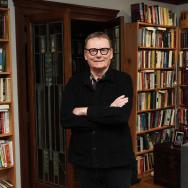About two decades before he came to the University of Chicago, Prof. James A. Robinson was a young researcher examining the creation of prosperity around the world. While economists were enthusiastic about his early theoretical work, he yearned to learn more.
“Talking about these differences between countries and looking at their development wasn’t enough,” Robinson recalled. “I felt I needed to know much more about the politics, the institutions—about how things worked.”
So he began to travel the globe in search of that knowledge, conducting research in Colombia, Bolivia, Botswana, and other countries in Latin America and sub-Saharan Africa— trying to understand the importance of economic and political institutions in a country’s prosperity. The result of that global journey, which began in the early 1990s, culminated this fall when Robinson and his collaborators at MIT—economists Daron Acemoglu and Simon Johnson—were awarded a Nobel Prize for their groundbreaking research on the role of institutions in the root causes of global inequality.
“I always tell people that for us, being an academic is not a profession. It’s a calling, like being a priest or an artist,” said Robinson, an economist and political scientist who directs The Pearson Institute for the Study and Resolution of Global Conflicts. “I love that. We’re just so totally committed to understanding and thinking about the world.”
Robinson and his fellow Nobel laureates will receive their honor, known as the Sveriges Riksbank Prize in Economic Sciences in Memory of Alfred Nobel, on Dec. 10 in Sweden. He also will deliver a lecture reflecting on his pioneering research on differences between prosperous and poor nations—work that continues to influence world leaders today.
“In Western development economics,” Robinson said, “we’ve completely mischaracterized many of the problems in the world because we fail to understand the ways in which other societies differ from our own society and the way that people in those societies think about them.”
Transforming societies
The Royal Swedish Academy of Sciences honored the Nobel laureates for providing new insights into why such vast differences in prosperity exist between nations. In examining various political and economic systems that European colonizers introduced to countries, Robinson, Acemoglu and Johnson demonstrated the important relationship between institutions and prosperity.
In perhaps its simplest context, that relationship is this: where Europeans introduced institutions that exploited indigenous populations and extracted resources for colonizers’ benefit, the nations generally are poorer and endure low economic growth. In countries where colonizers introduced institutions with broadly distributed political power and widely accessible economic opportunity—and an effective rule of law—the nations become prosperous.
Robinson, Acemoglu and Johnson also developed theoretical tools to explain why different institutions persist and how they can change.
That research is “of such substantive depth and methodological breadth that it sets the agenda in multiple academic fields,” said Ethan Bueno de Mesquita, dean and the Sydney Stein Professor at UChicago’s Harris School of Public Policy. “All over the world, leaders draw on Jim’s insights as they seek to transform their societies for the better.”
Robinson’s work receives perhaps its widest audience through “Why Nations Fail: The Origins of Power, Prosperity and Poverty” (2012), the best-selling book he and Acemoglu wrote. He and Acemoglu also collaborated on “The Narrow Corridor: States, Societies, and the Fate of Liberty” (2019). Robinson has co-edited three other books.
Prof. James A. Robinson discusses his research and the work of the Pearson Global Institute at UChicago. (Video courtesy of The Pearson Institute)
Looking back on years of research, Robinson pointed to early milestones that propelled he and Acemoglu: The realization that colonial institutions—not geography—was crucial to nations’ prosperity; and the revelations that emerged when Johnson added his data skills to the research in 1999.
Robinson recalled momentum building in about 2000, when Acemoglu presented a lecture at a Stanford University conference that Robinson attended.
“You could see that people were super fascinated by it,” said Robinson, the Reverend Dr. Richard L. Pearson Professor of Global Conflict Studies and University Professor in the Harris School of Public Policy and the Department of Political Science. “The room was electric. I remember walking out of the Economics Department at Stanford, and saying: ‘Oh man, we really hit it out of the park.’”
‘Life-changing’ work in Africa
Robinson’s early quest for more knowledge started in Colombia, where he has been teaching during summers since 1994. He expanded his work beyond teaching, then expanded his scope beyond Colombia. A breakthrough occurred in 1998 when his quest for more knowledge prompted him to make his first trip to Botswana, known for its prosperity compared to other African nations.
While teaching a class on Africa in 2019, Robinson discovered that the British Library was digitizing colonial era intelligence reports from 1930s in Nigeria--and that the professor in charge of the effort was Marquette University historian Chima J. Korieh.
Robinson drove to Milwaukee to speak with Korieh, and the two became fast friends. Korieh invited Robinson to review the archived intelligence reports in Nigeria and visit Korieh’s village in eastern Nigeria.
“I’m now a chief in his village,” Robinson said, “and a fellow at the Institute of African Studies at the University of Nigeria.” For years since, he has brought Nigerian scholars to the University of Chicago and co-teaches with them.
“I loved everything,” he said. “The whole thing was life-changing for me. I’m part of an academic and intellectual community in Africa in a way that I never was before.”
Estéfano Rubio, a former student of Robinson’s at UChicago, said the research the Nobel laureates produced on the importance of inclusive institutions is often discussed by the World Bank and International Monetary Fund in the context of development policies.
“Their contribution allows a meta-understanding of the objects of our study as social scientists,” said Rubio, an economics postdoctoral associate at University of Rochester who will become an assistant professor in the Business School of Universidad Adolfo Ibáñez in Chile in 2025. “Economists and political scientists have been studying for centuries many of the economic and political institutions highlighted in James and Daron’s work.”
But Robinson, Acemoglu and Johnson were the first to explain and demostrate why institutions differ across countries, why they were effective in some places, and how they persevered, Rubio said.
‘Friendship interwoven with collaboration’
Robinson’s research partnership and friendship with Acemoglu began in 1992, when Robinson was a Ph.D. student giving a lecture at the London School of Economics, in the hopes of landing a job. A young man in the front row kept challenging almost everything he said.
“I can still see his face,” recalled Robinson. “I thought, ‘Who is this guy? He’s so annoying.’”
The “guy” was Acemoglu, then a Ph.D. student at the school who, after the lecture, attended dinner at an Indian restaurant with the search committee and Robinson. The two started talking, bonding over their enthusiasm for a research paper on the evolution of institutions governing public choice in 17th-century England.
“Friendship interwoven with collaboration” has always been the defining theme of the relationship between Acemoglu and Robinson, Acemoglu said.
“Jim is a true intellectual, driven by an amazing curiosity and a thirst for knowledge,” Acemoglu said. “He is one of the unique people I know who is able to combine a deep respect for facts together with creativity.”
Robinson called Acemoglu “a very ambitious, incredibly brilliant” scholar who has a gift for “lateral thinking and just thinking completely out of the box.”
He said he hopes the legacy of the Nobel laureates’ work will be much more holistic and richer thinking about comparative economics and economic development.
Power and prosperity
Over the course of his research, Robinson said, the dynamics of institutions’ impact on prosperity have remained mostly unchanged, although discussion is intensifying over political conditions for achieving inclusive economic institutions.
“I think my view is still basically the same,” Robinson said. “Power tends to corrupt and absolute power corrupts absolutely.”
The future of the relationship between institutions and prosperity is being severely challenged now, he added, by populism emerging in the U.S. and elsewhere.
“All I can say is, as we point out in 'Why Nations Fail,’ this is not the first time this has happened in the United States,” Robinson said, “where institutions have been challenged. In the past, the U.S. has shown this amazing ability to reinvent itself and bounce back. Is there something inevitable about that? Of course not. Could everything go off the rails? Absolutely.
“We’re living through a moment which is a little frightening for me as a citizen,” he said, “but it’s very interesting as a social scientist.”
This October, at a UChicago news conference announcing the Nobel Prize, Robinson was asked for his advice to young researchers. He said it’s important to understand your topic from the perspective of the people you’re studying.
“We all share this history on the planet, but human beings have built very different societies in different parts of the world,” Robinson said. “And I would say the first thing is to think about it like that and think about a question that’s relevant to those people and to their context and to their aspirations.
“It’s really all about the question,” Robinson said, “and trying to find the right kind of question.”

